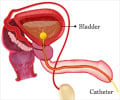
Currently, bacteria from urine are identified by biochemical testing of the bacterial colonies that are able to grow on agar plates. This standard method is not ideal; in the best case scenario, results are available after 12 hours, but longer waiting times are not uncommon. If the patient has already been treated with antibiotics, this can impair bacterial growth on agar which increases the probability of misclassification. If doctors are unable to precisely identify the bacterium causing the UTI, a broad spectrum antibiotic is prescribed. These are less effective than specifically targeted antibiotics and also encourage development of antibiotic resistance.
The MALDI-TOF technique identifies bacteria by analysing their proteins directly from the urine sample. MALDI-TOF mass spectrometry works by firing pulses of UV light at biological samples. All the particles become either positively or negatively charged and are then forced down a tunnel by an electrical force. As the particles have the same charge, their speed is dependent on their mass, allowing biomolecules such as proteins or DNA to be identified. As bacteria do not need to be cultured on agar, the MALDI-TOF method cuts the time to identify UTI-causing bacteria to less than 30 minutes. In addition, MALDI-TOF can detect and identify bacteria at much lower levels than are needed for current standard diagnostic techniques.
Source-Eurekalert













